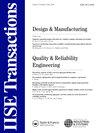Robust expected improvement for Bayesian optimization
IF 2
3区 工程技术
Q3 ENGINEERING, INDUSTRIAL
引用次数: 0
Abstract
AbstractBayesian Optimization (BO) links Gaussian Process (GP) surrogates with sequential design toward optimizing expensive-to-evaluate black-box functions. Example design heuristics, or so-called acquisition functions, like expected improvement (EI), balance exploration and exploitation to furnish global solutions under stringent evaluation budgets. However, they fall short when solving for robust optima, meaning a preference for solutions in a wider domain of attraction. Robust solutions are useful when inputs are imprecisely specified, or where a series of solutions is desired. A common mathematical programming technique in such settings involves an adversarial objective, biasing a local solver away from “sharp” troughs. Here we propose a surrogate modeling and active learning technique called robust expected improvement (REI) that ports adversarial methodology into the BO/GP framework. After describing the methods, we illustrate and draw comparisons to several competitors on benchmark synthetic exercises and real problems of varying complexity.Keywords: Robust OptimizationGaussian ProcessActive LearningSequential DesignDisclaimerAs a service to authors and researchers we are providing this version of an accepted manuscript (AM). Copyediting, typesetting, and review of the resulting proofs will be undertaken on this manuscript before final publication of the Version of Record (VoR). During production and pre-press, errors may be discovered which could affect the content, and all legal disclaimers that apply to the journal relate to these versions also.稳健的期望改进贝叶斯优化
摘要贝叶斯优化(BO)将高斯过程(GP)与序列设计相结合,以优化昂贵的黑盒函数。示例设计启发式,或所谓的获取函数,如预期改进(EI),平衡探索和开发,在严格的评估预算下提供全局解决方案。然而,它们在求解鲁棒最优时就会出现不足,这意味着在更广泛的吸引力领域中对解决方案的偏好。当输入不精确指定或需要一系列解时,鲁棒解是有用的。在这种情况下,一种常见的数学规划技术涉及到一个对抗性目标,使局部求解器偏离“尖锐”槽。在这里,我们提出了一种称为稳健预期改进(REI)的代理建模和主动学习技术,该技术将对抗性方法移植到BO/GP框架中。在描述了这些方法之后,我们在基准综合练习和不同复杂性的实际问题上说明并比较了几个竞争对手。关键词:稳健优化aussian流程主动学习顺序设计免责声明作为对作者和研究人员的服务,我们提供此版本的已接受手稿(AM)。在最终出版版本记录(VoR)之前,将对该手稿进行编辑、排版和审查。在制作和印前,可能会发现可能影响内容的错误,所有适用于期刊的法律免责声明也与这些版本有关。
本文章由计算机程序翻译,如有差异,请以英文原文为准。
求助全文
约1分钟内获得全文
求助全文
来源期刊

IISE Transactions
Engineering-Industrial and Manufacturing Engineering
CiteScore
5.70
自引率
7.70%
发文量
93
期刊介绍:
IISE Transactions is currently abstracted/indexed in the following services: CSA/ASCE Civil Engineering Abstracts; CSA-Computer & Information Systems Abstracts; CSA-Corrosion Abstracts; CSA-Electronics & Communications Abstracts; CSA-Engineered Materials Abstracts; CSA-Materials Research Database with METADEX; CSA-Mechanical & Transportation Engineering Abstracts; CSA-Solid State & Superconductivity Abstracts; INSPEC Information Services and Science Citation Index.
Institute of Industrial and Systems Engineers and our publisher Taylor & Francis make every effort to ensure the accuracy of all the information (the "Content") contained in our publications. However, Institute of Industrial and Systems Engineers and our publisher Taylor & Francis, our agents, and our licensors make no representations or warranties whatsoever as to the accuracy, completeness, or suitability for any purpose of the Content. Any opinions and views expressed in this publication are the opinions and views of the authors, and are not the views of or endorsed by Institute of Industrial and Systems Engineers and our publisher Taylor & Francis. The accuracy of the Content should not be relied upon and should be independently verified with primary sources of information. Institute of Industrial and Systems Engineers and our publisher Taylor & Francis shall not be liable for any losses, actions, claims, proceedings, demands, costs, expenses, damages, and other liabilities whatsoever or howsoever caused arising directly or indirectly in connection with, in relation to, or arising out of the use of the Content. Terms & Conditions of access and use can be found at http://www.tandfonline.com/page/terms-and-conditions .
 求助内容:
求助内容: 应助结果提醒方式:
应助结果提醒方式:


